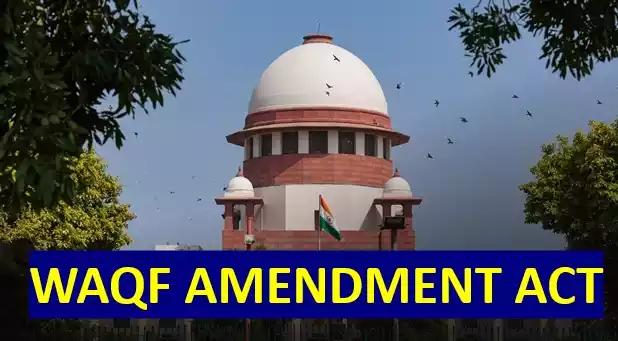Supreme Court to Hear Plea Against Waqf Amendment Act on April 16
New Delhi: The Supreme Court is set to hear a series of petitions next week challenging the constitutional validity of the Waqf (Amendment) Act, 2025. According to the cause list published on the apex court’s website, a bench led by Chief Justice of India (CJI) Sanjeev Khanna, along with Justices Sanjay Kumar and K.V. Viswanathan, will take up the matter on April 16.
Multiple petitions have been filed before the Supreme Court questioning the legitimacy of the recent amendments to the Waqf Act, 1995.
Meanwhile, on Wednesday, the Hindu Sena submitted an intervention application in support of the Waqf (Amendment) Act, 2025. The application, filed by the organization’s National President, argued that the amendments do not infringe upon the rights of the Muslim community. Instead, it claimed that the previous version of the Waqf Act, particularly Sections 3 and 40, unfairly allowed Waqf Boards to take control of properties belonging to non-Muslims. The Hindu Sena asserted that the amendments now ensure justice for non-Muslims whose properties were previously seized or claimed as waqf assets.
The Waqf (Amendment) Bill, which was recently passed in both Houses of Parliament and received Presidential assent, has sparked significant political controversy. The Congress party has announced its intent to challenge the new law in the Supreme Court, alleging that it undermines the basic structure of the Constitution and is intended to divide the nation along religious lines. Conversely, the government has defended the legislation, arguing that it will benefit millions of underprivileged Muslims without harming any individual from the community.
Minority Affairs Minister Kiren Rijiju has also emphasized that the amendments do not interfere with waqf properties and reaffirmed the government’s commitment to inclusive development under the principle of “Sabka Saath, Sabka Vikas.”
Among those who have filed petitions challenging the Act is Congress MP and party whip in the Lok Sabha, Mohammad Jawed. His plea contends that the amendments violate several constitutional provisions, including Articles 14 (right to equality), 25 (freedom of religion), 26 (rights of religious denominations to manage their affairs), 29 (minority rights), and 300A (right to property).
Similarly, AIMIM chief Asaduddin Owaisi has approached the Supreme Court, arguing that the amendments are “blatantly unconstitutional” and violate Articles 14, 15, 21, 25, 26, 29, 30, and 300A.
Other petitioners opposing the Act include the Association for Protection of Civil Rights, AAP leader Amanatullah Khan, Maulana Arshad Madani of Jamiat Ulema-i-Hind, the All India Muslim Personal Law Board (AIMPLB), the Social Democratic Party of India (SDPI), the Indian Union Muslim League, Taiyyab Khan Salmani, and Anjum Kadari.
The concept of ‘Waqf’ in Islamic tradition refers to the permanent dedication of a property by a Muslim for religious or charitable purposes, such as mosques, schools, hospitals, or other public institutions.
With the Supreme Court set to take up the matter, the debate over the Waqf (Amendment) Act, 2025, continues to intensify.
Get Latest News Live on MTIMES along with Breaking News and Top Headlines, Political News and around The World.
You May Like
Trending Searches Today |
Big Screen to Small Screen: Ajith Kumar’s Vidaamuyarchi to Premiere on TV Worldwide




